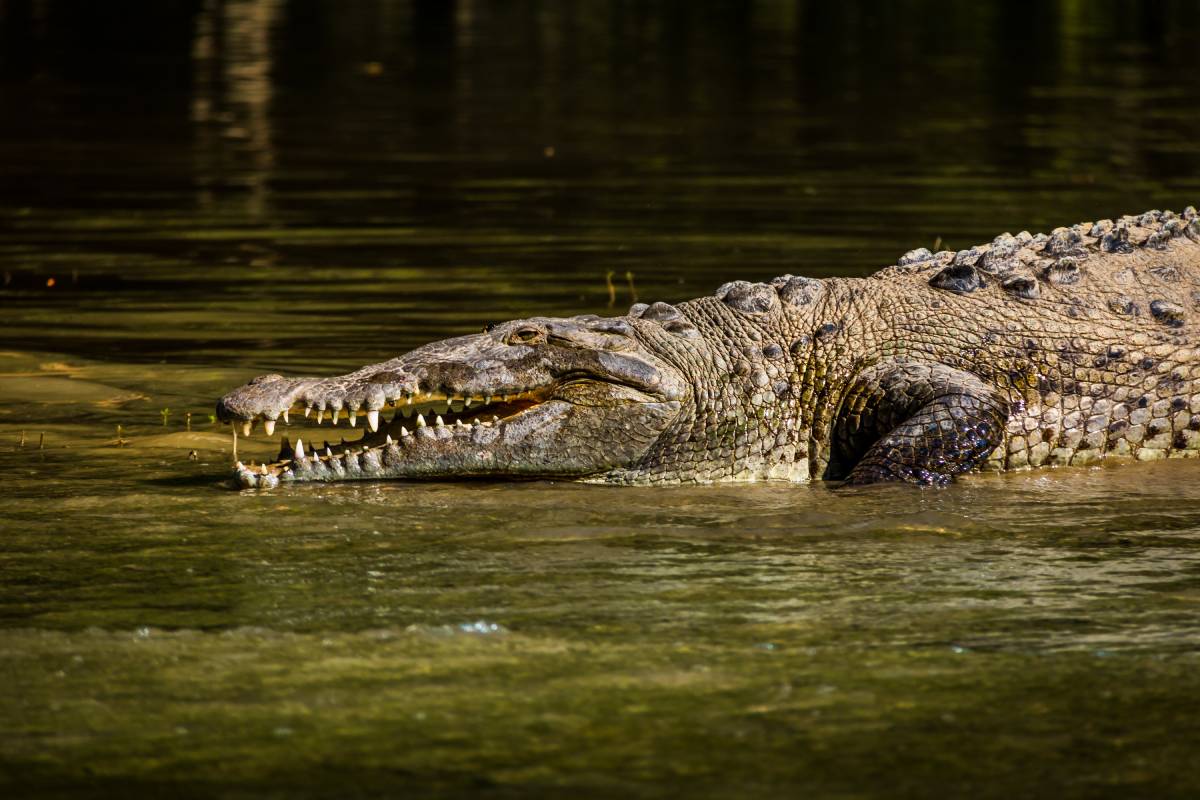Crocodiles and hippos are two of Africa’s most iconic and formidable animals, often sharing the same aquatic habitats. Despite their size, strength, and predatory natures, these creatures do not engage in constant conflict.
In fact, crocodiles generally avoid hippos, even though they are natural predators. This raises several interesting questions: Why do crocodiles tend not to bother hippos? Are hippos friendly to crocodiles, or is there an underlying antagonism between them? Moreover, how aggressive are hippos, really?
In this article, we’ll explore the fascinating relationship between these powerful animals, delving into their behaviors, territorial instincts, and interactions, to better understand why crocodiles and hippos don’t often clash – and why hippos should never be underestimated.
Why Do Crocodiles Not Bother Hippos?
At first glance, crocodiles and hippos might seem like natural enemies. Crocodiles are fierce predators, known for their ambush-style hunting tactics, using their powerful jaws to seize prey that comes too close to the water’s edge.
On the other hand, hippos are large, strong, and territorial creatures that spend much of their time in the water. Despite their size differences, crocodiles tend not to bother hippos, and there are a few key reasons for this.
Size and Strength of Hippos
One of the main reasons crocodiles avoid attacking hippos is the sheer size and strength of these animals. Adult hippos can weigh between 3,000 to 5,000 pounds (1,400 to 2,300 kilograms) and grow up to 16.5 feet (5 meters) in length.
In contrast, crocodiles, while powerful, are typically smaller, especially when compared to an adult hippo. Crocodiles generally target smaller, more vulnerable animals for prey, such as fish, birds, and smaller mammals, rather than taking on an animal of the hippo’s size.
Powerful Defense Mechanisms
Hippos have an impressive set of natural defenses. Their jaws are extremely powerful, capable of crushing bones with a bite force of over 1,800 psi (pounds per square inch). This makes them highly capable of defending themselves against predators, including crocodiles.
A crocodile that attempts to attack a hippo is likely to face serious consequences if the hippo decides to retaliate. Hippos also have thick skin and a massive, muscular body, making them difficult to penetrate or subdue.
Territorial Behavior
Hippos are territorial animals, especially in the water where they spend most of their time. They will fiercely defend their space from intruders, including crocodiles.
This territorial behavior means that crocodiles are unlikely to linger near hippos for long, as they are smart enough to recognize that trying to challenge a hippo would be dangerous.
Additionally, hippos are social animals that live in groups, which gives them added protection from potential threats.
Crocodile’s Preference for Easier Prey
Crocodiles are opportunistic hunters, preferring easier prey like antelopes, zebras, or birds. They avoid risking injury from hippos, which can retaliate powerfully.
Crocodiles strike quickly from the water, but hippos’ size and strong defenses make them difficult to catch off-guard.
Are Hippos Friendly to Crocodiles?
While crocodiles avoid bothering hippos, this doesn’t mean hippos are friendly toward crocodiles. Their relationship is often antagonistic. Tourists in Australia, where both animals may be seen in wildlife parks, might observe their complex dynamics.
Aggressive Encounters
Hippos and crocodiles are both territorial and protective. While crocodiles avoid large hippos, Nile crocodiles may prey on young or sick hippos.
They might attempt to attack baby hippos, but adult hippos protect their young aggressively. Hippos have been known to kill crocodiles in defense of their space, using their sharp teeth and powerful jaws.
Mutual Tolerance in Shared Environments
There are instances where crocodiles and hippos can coexist in the same environments without much direct conflict. In some cases, crocodiles can be seen basking in the sun near hippos, and hippos may not immediately react. However, this tolerance is usually a matter of mutual avoidance.
Crocodiles do not actively seek out hippos as prey, and hippos, although not “friendly,” are willing to share the environment as long as their personal space is not threatened. This coexistence, however, can quickly turn hostile if one animal feels provoked or threatened.
Cleaning Symbiosis?
An interesting aspect of the relationship between crocodiles and hippos is the occasional symbiotic behavior in parts of Africa. Some crocodiles rest near hippos or open their mouths wide, possibly to clean their teeth.
While this may seem like mutualism, it’s more of a passive interaction. Crocodiles don’t rely on hippos for food, and hippos don’t benefit from crocodiles, suggesting mutual indifference rather than true friendship.
How Aggressive Are Hippos?
Hippos are incredibly aggressive animals, particularly when it comes to defending their territory, their young, and their space in the water.
Despite their somewhat slow appearance and herbivorous diet, hippos are one of the most dangerous animals in Africa. Their aggression can be triggered by various factors, including the need to protect themselves or their young.
Territorial Aggression
Hippos are highly territorial, especially in the water. They spend a significant amount of time submerged, and they aggressively protect their territory from other animals.
This includes other hippos, as well as crocodiles, who may venture too close to their space. Hippos will chase off intruders, including crocodiles, and use their massive jaws to defend their position.
Protectiveness of Young
A mother hippo is especially dangerous when protecting her young. If a crocodile or any other predator poses a threat to a baby hippo, the mother will respond with extreme aggression. Hippos will not hesitate to charge at any perceived threat to their offspring, using their powerful jaws to strike down their enemies.
Danger to Humans
While hippos are herbivores and primarily feed on grass, they are responsible for more human deaths in Africa than many other large animals, including lions.
Hippos are highly territorial and can be aggressive toward boats and humans who venture too close to their territory. Their powerful jaws and ability to run at surprising speeds make them particularly dangerous when provoked or threatened.
Speed and Strength
Despite their large, bulky bodies, hippos are fast runners and are capable of charging at speeds of up to 30 kilometers per hour (18.6 miles per hour) on land.
In the water, they are incredibly agile and can swim quickly. This combination of speed, strength, and aggression makes hippos a formidable force in the wild.
Conclusion
While crocodiles and hippos coexist in many of the same environments, the relationship between them is one of avoidance and occasional hostility. Crocodiles and hippos because of the latter’s size, strength, and aggressive nature.
Hippos, although not actively seeking out conflict, will not hesitate to defend their space and young from crocodiles and other potential threats. Hippos are highly aggressive and territorial animals that will use their powerful jaws and physical strength to defend themselves, making them one of the most dangerous animals in Africa.
The interactions between crocodiles and hippos are complex, and while they may sometimes tolerate each other in shared environments, this relationship is far from friendly.
Hippos are not naturally inclined to befriend crocodiles, and any interaction between the two is usually a matter of avoiding conflict or defending territory. Hippos’ aggressive nature and dominance in their habitats ensure that they remain one of the most formidable animals in the wild.

